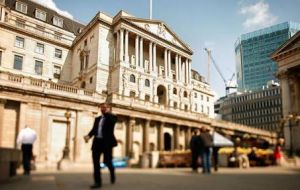MercoPress. South Atlantic News Agency
Bank of England to pump additional £ 50 billion to the economy

The Bank of England has held interest rates unchanged at their record low of 0.5% but stepped up its program to boost the economy with injections of new money. It is the second month in a row that rate-setters have held the cost of borrowing as attention turns to the results of its scheme of quantitative easing (QE) - effectively printing money - to ease credit conditions in the ailing economy.
The Monetary Policy Committee (MPC) said it planned an additional £50 billion for the program, raising the total to £125 billion, from £75 billion. The MPC has spent more than £50 billion so far on assets including Government and corporate debt.
Chancellor Alistair Darling has given the Bank permission to spend a total of £150 billion in the QE program.
In a statement, the Bank said: ”The world economy remains in deep recession. Output has continued to contract and international trade has fallen precipitously. The global banking and financial system remains fragile despite further significant intervention by the authorities. In the United Kingdom, GDP fell sharply in the first quarter of 2009. But surveys at home and abroad show promising signs that the pace of decline has begun to moderate”.
Although CPI inflation was 2.9% in March, “the degree of spare capacity in the economy has increased and the loosening in the labour market has contributed to a sharp easing in pay pressures. CPI inflation is likely to drop below the 2% target later this year, driven in part by diminishing contributions from food and energy prices. The substantial margin of spare capacity in the economy should continue to bear down on inflation thereafter”.
The Committee finally noted that the outlook for economic activity was dominated by two countervailing forces: the process of adjustment in train in the UK economy, as private saving rises and banks restructure their balance sheets, combined with weak global demand, will continue to act as a significant drag on economic activity. But pushing in the opposite direction, there is considerable economic stimulus stemming from the easing in monetary and fiscal policy, at home and abroad, the substantial depreciation in sterling, past falls in commodity prices, and actions by authorities internationally to improve the availability of credit. That stimulus should in due course lead to a recovery in economic growth” but the timing and strength of that recovery is highly uncertain.




Top Comments
Disclaimer & comment rulesCommenting for this story is now closed.
If you have a Facebook account, become a fan and comment on our Facebook Page!